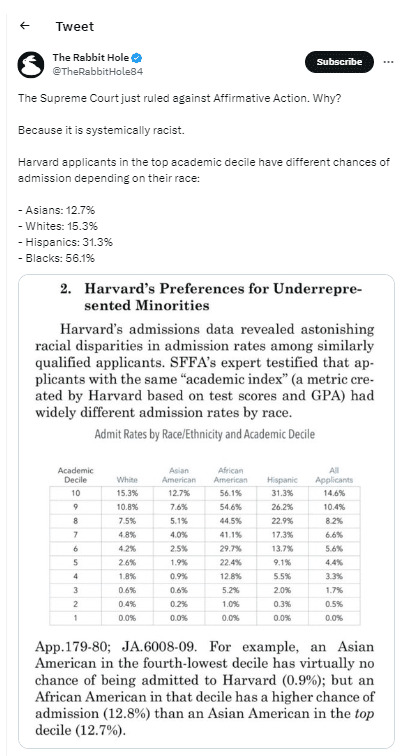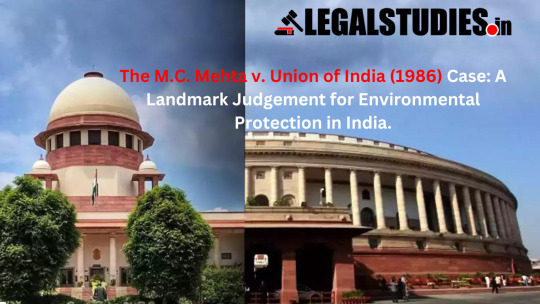#landmark supreme court
Explore tagged Tumblr posts
Text

Landmark Supreme Court Decision: Affirmative Action Policies Ruled Unconstitutional
In a historic and momentous decision, the Supreme Court has resoundingly ruled that the affirmative action policies pursued by Harvard University and the University of North Carolina blatantly violate the Constitution. With a solid majority of 6-3, Chief Justice John Roberts was joined by Justices Samuel Alito, Clarence Thomas, Brett Kavanaugh, Neil Gorsuch, and Amy Coney Barrett in delivering this crucial verdict. Justices Ketanji Brown Jackson, Elena Kagan, and Sonia Sotomayor expressed dissenting opinions. Notably, Jackson recused herself from the Harvard ruling due to her involvement on a board associated with the university.
The opinion of the Court unequivocally underscores the imperative of treating students as individuals based on their unique experiences rather than making admissions decisions based on their race. It unequivocally condemns universities that have persistently chosen to prioritize racial considerations over personal achievements, acquired skills, and lessons learned. The Supreme Court has declared that such an approach is incompatible with our constitutional principles.
In his written opinion, Chief Justice Roberts asserts that the admissions systems employed by the universities in question not only do not comply with the Fourteenth Amendment’s Equal Protection Clause but also perpetuate negative stereotypes and treat race as a decisive factor in the admissions process. The Court takes a critical stance against the universities’ feeble arguments, suggesting that race is not a negative factor and asserting that the demographic composition of admitted classes would significantly change without race-based admissions.
Furthermore, the Supreme Court points out the lack of a meaningful connection between the universities’ pursued goals and the methods they employ. It raises valid concerns about the imprecision and arbitrariness inherent in the racial categories utilized by the institutions. The Court astutely argues that such opaque and broad categorizations undermine the universities’ professed commitment to diversity and inclusion, as they fail to account for the unique characteristics and needs of specific racial and ethnic groups. The ruling rightly questions the credibility of the universities’ claims and unequivocally dismisses their request for deference in utilizing race as a factor in admissions. Havard applications have different chances of admission depending upon their race. The lowest acceptance was Asians, followed by Whites.

Screenshot: Twitter: The Rabbit Hole
The lawsuit challenging these affirmative action policies was championed by Students for Fair Admissions, seeking to overturn previous lower court rulings that upheld the universities’ programs. This momentous Supreme Court decision serves as a resounding victory for equal protection principles and the constitutionally mandated fairness in college admissions. It signals a much-needed setback for the flawed and divisive practices of affirmative action. It can potentially bring about a reevaluation of similar policies at other institutions across the nation.
Perhaps the most important opinion written comes from Justice Clearance Thomas. Born into poverty in the Deep South during the Jim Crow Era, Justice Thomas possesses a poignant and powerful perspective on the issue. In the opinion released on Thursday, Justice Thomas did not shy away from addressing the grave failure of our nation: slavery and its aftermath. He also criticized the Court’s misinterpretation of the Reconstruction Amendments, echoing the concerns raised by Justice Harlan in Plessy.
Thomas firmly stated that we must not repeat this mistake simply because we believe that current arrangements are superior to the Constitution like our predecessors did. Moreover, Thomas emphasized that this ruling brings America closer to achieving a more perfect union that lives up to its promise, transcending the stains of past racism. While acknowledging the social and economic hardships that have afflicted his race and all victims of discrimination, he maintained an enduring hope that our country would fulfill the principles eloquently articulated in the Declaration of Independence and the Constitution.
2 notes
·
View notes
Text






























Queen Victoria chose Ottawa, then a small logging town, as the capital of Canada on December 31, 1857.
#Ottawa#capital#31 December 1857#anniversary#Canadian history#Ontario#travel#Canada#summer 2018#original photography#cityscape#architecture#Parliament Hill#Peace Tower#Centre Block#East Block#West Block#Library of Parliament#Notre-Dame Cathedral Basilica#Maman by Louise Bourgeois#Supreme Court of Canada#Gatineau#Rideau Canal Locks#Christ Church Cathedral Ottawa#vacation#tourist attraction#landmark
2 notes
·
View notes
Text
Indira Devi vs. Veena Gupta: Right of Repurchase is Assignable
Case: Indira Devi (Appellant) versus Veena Gupta & Ors. (Respondents)
Court: The Supreme Court of India.
Jurisdiction: Supreme Court of India Civil Appellate Jurisdiction
Civil Appeal No. 9833 of 2014
Judgement Date: July 4 2023.
Bench: Honorable Justice Abhay S. Oka & Honorable Justice Rajesh Bindal
Concepts this case deals with –
Major:
Assignability of Right of Repurchase.
Transfer of Right in Immovable Property through Gift Deed.
Conditional Sale Deed.
Minor:
Who shall perform the considerations?
Interdependent contingent considerations.
Property Involved –
Property ‘A’
Persons Involved –
Mr. Kishori Lal Sahu: Exclusive Owner of Property ‘A’.
Smt. Veena Gupta: Daughter in Law of Kishori Lal Sahu. (Respondent)
Mr. Kaleshwar Prasad Singh: Tenant on Property ‘A’.
Smt. Indira Devi: Daughter of Kaleshwar Prasad Singh. (Appellant)
Documents Involved –
Conditional Sale Deed b/w Kishori Lal Sahu & Indira Devi concerning Property ‘A’.
Gift Deed by donor Kishori Lal Sahu to donee Veena Gupta, gifting number of properties including right/interest in Property ‘A’.
Suits & Appeals –
Original Suit: Trial Court 1983 - Civil Suit was Filed in 1983 by Veena Gupta & Kishori Lal Singh (at the time not deceased) for Special Performance as well as non-payment of rent against Indira Devi. (Suit Dismissed)
First Appeal: Lower Appellate Court 2000; Veena Gupta appeals against the dismissal of the suit. (Appeal is Dismissed)
Second Appeal: High Court Patna (Bihar): Second Appeal No. 123 of 2000; Veena Gupta appeals against the dismissal by lower appellate court. (Appeal admitted and adjudged on)
Supreme Court: Civil Appeal No. 9833 of 2014; Indira Devi appeals against the order of High Court. (Appeal is dismissed)

Facts of the Case –
Kishori Lal Sahu is the owner of property ‘A’ and Kaleshwar Prasad Singh is a tenant on the said property.
On 5th August 1977 Kishori Lal Singh the Owner & His Son due to dire need of funds executed a conditional sale deed in favour of Indira Devi (Vendee) d/o Kaleshwar the tenant. The condition was that the Vendee would pay Rs. 5000 as consideration to the Vendor, and if this Rs. 5000 is not returned by the Vendor by July 1984, the Vendee will become the owner of the property, and if the money is paid back, the Vendee will have to execute a sale deed of the property in favour of the Vendor that is to return the property.
On 14th February 1983 Kishori Lal executed a registered gift deed whereby he gifted number of properties to Veena Gupta (Respondent No. 1) the Daughter in Law of Kishori Lal and Wife of Gopal Prasad. The number of properties gifted contained the property in question where it was mentioned that the said property was transferred to Indira Devi, which can be retrieved by fulfilling conditions, that is to pay Rs. 5000 by July 1984. The Gift Deed was executed in 1983.
The Vendors that is Kishori Lal was ready to pay Rs. 5000, but the Vendees didn't agree and a civil suit was filed in 1983 in a Trial Court.
Plea by Respondent (Plaintiff in that suit) in Trial Court 1983: Special Performance Decree requiring Indira Devi/Kaleshwar (Defendant there) to accept Rs. 5000 and return the property, and if there is no performance, a decree directing appellant to register the sale deed in favour of Veena Gupta (Kishori Lal 2nd Plaintiff) with possession.
Representations in the Supreme Court:
Appellants (Indira Devi):
Kishori Lal executed the conditional deed in favour of Indira. And thus the right of repurchasing the property lies with Kishori Lal as the said right is personal. Stating he had no right to assign the right to third party.
Gift Deed executed is not valid as it contains consideration to be paid for obtaining the said property.
Judgements in the following cases: Bhoju Mandal v. Debnath Bhagat, Kapilaben vs. Ashok Kumar Jayantilal Sheth; were cited for supporting the case.
Respondents (Veena Gupta):
In the Gift Deed it is specifically mentioned that how donee may obtain the property by performing the promise of the contract/deed. 'She will have all the rights which Kishori Lal had'.
When as per the contract the vendor (Kishori Lal, non-deceased at the time of original suit of 1983 / Veena Gupta) was to give Rs. 5000 for repurchase, the vendor was willing to give but the consideration was not accepted by Indira Devi, thus to complete their part of promise Vendor deposited Rs. 5000 with Court of Original Suit with its permission.
The condition precedent for the repurchase was thus completed, and Kishori Lal assigned the right to repurchase to Veena Gupta through Gift deed.
To counter that the right of repurchase was personal, following judgements were cited for support: T.M. Balakrishna Mudaliar vs. M. Satyanarayana Rao, Shyam Singh vs Daryao Singh. It was contested that the right was assignable and not personal. And even if the Court would deal with the issue sensitively, the party assigned to was not any third party rather it was a party from the family of Kishori Lal himself.
Law & Analysis
Following are the Issues to be answered by us on the basis of facts of the case, representations made, and previous judgements:
Is the Gift deed valid?
Is the right of repurchase assignable or personal?
1. Will first begin with the validity of Gift Deed:
Gift is defined under Section 122 of Transfer of Property Act, 1882 as: Gift is the transfer of certain existing moveable or immoveable property made voluntarily and *without consideration*, by one person, called the donor, to another, called the donee, and accepted by or on behalf of the donee.
Under the Transfer of Property Act Immovable Property is defined to mean anything except standing timber, growing crops or grass. Further interpretation of other definitions of other acts include Land, Things attached to earth and benefits , Benefits to arise from land. If further studied a Right if related to movable or immovable properties then a Right related to Immovable Property becomes a immovable property. Even if we consider it a movable property it can still be gifted through a gift deed.
Thus it is agreeable that in this case in the gift deed the Property 'Physical' in Question is not gifted, rather the right to repurchase to same is transferred. The consideration comes in question when dealing with the physical actual property in question. The donee didn't have to pay any consideration for the right which was transferred.
2. Is the right to repurchase personal or can be assigned?
To begin with, we must look into the contract itself that is its clauses, content and intention of the parties which may be based of the language of the contract or the circumstances preceding or at the time when the contract was executed.
- In our case on the basis of the part of the sale deed presented before the High Court the deed didn't specifically contain any clauses prohibiting the assignment of the right of repurchase.
- At first, although it is not strictly related to our case, but we must look at Section 40 of the Indian Contracts Act to ascertain whether a promise or performance is personal: 'If it appears from the nature of the case that it was the intention of the parties to any contract that any promise contained in it should be performed by the promisor himself, such promise must be performed by the promisor. In other cases, the promisor or his representatives may employ a competent person to perform it.' Thus if a promise is of a nature that only the promisor has the ability to perform or skills then it can be performed only by the promisor.
Assignability of Contractual Rights or Obligations:
Under Indian Law any type of contract can be assigned except those specifically prohibiting the same or which are of personal nature. In the case of Kapilaben v. Ashok Kumar Jayantilal Sheth the Supreme Court observed that when entire promise or perfomance of one party towards the other are transferred to third party, then the consent of the promisee is required but when assigning just the rights or obligations to another doesn't require consent except when it is not of personal nature or if it is not specifically prohibited.
To stress on this point we will look at some of the cases cited by the counsels of the present case:
1. T.M. Balakrishna Mudaliar vs. M. Satyanarayana Rao –
The Court refered to the judgement in the case of Sakalaguna Nayadu v. Chinna Munuswami Naykar where in the Privy Council held that if the contract of repurchase did not specifically say that such benefit was only for the parties contracting, then the contract can be assigned and would be enforceable by law.
2. Shyam Singh vs Daryao Singh –
The facts of the stated case were somewhat similar to those of the present case. Lower courts opined that if there is no clause in the sale deed permitting assignment, then prohibition of the same can be read into the contract. When the matter came to Supreme Court the issue at point was considered whether such a prohibition can be read into the document by implication. The court by citing Section 15(b) of the Specific Relief Act, 1963 held that in absence of words indicating prohibition in the contract, then such prohibition cannot be read into the terms of documents.
Section 15 (b) of Specific Relief Act, 1963 stipulates that specific performance of a contract may be obtained by the representative in interest or the principal thereto: Except if it is of personal nature.
The Court was fortified with the view stated in the above cases by the Justices.
3. Bhoju Mandal v. Debnath Bhagat –
The Court considered this case, but the case primarily was concerned with the question whether document was mortgage or sale deed with condition of repurchase.
4. Kapilaben v. Ashok Kumar Jayantilal Sheth –
In this case issue was transfer/assignment of contract was without the consent of the promisee. The Court referred to judgement in Khardah Co. Ltd v. Raymon & Co. wherein the Court held that there was a well-recognized distinction between two classes of assignments which are assignment of rights in a contract and assignment of obligations in a contract. While the total assignment of contract that is substituting a party by a new party with consent/agreement of both original parties is called novation, where on novation there is no link between the old party and the new/amended contract, in such a case as said consent is required.
But when considering assignment of just the rights under a contract consent of the promisee is not strictly required that is the rights are freely assignable unless the contract prohibits it.
The Court in the present case also referred to a commentary on The Indian Contract Act & Special Relief Act by authors Pollock and Mulla, wherein the authors opine that the benefits of contract can be assigned where it makes no difference to the person on whom the obligation lies to which of two person (original or asignee) he is to discharge it. That is where the identity of the party on which the obligation is to be discharged makes no difference to the promisee (one who has obligations), provided the original promisor has effected such assignment willingly, then such contract is prima facie assignable, except in case of personal consideration. Of course payment of money does not involve personal consideration/skills.
Thus, the Court in this present case held that the right was not personal rather freely assignable in absence of bar in contract.
Conclusion:
We can conclude simply that:
1. Non-assignability cannot be implied into contract if it doesn't specifically mention it.
2. Rights under a contract when not of a personal nature can be assigned freely without consent, except barred.
3. Gift of a interest in immovable property irrespective of consideration involved in further exercise of the right is valid as there is no apparent consideration for the right itself.
Thankyou for reading! Connect with me on LinkedIn Soham Sane.
#supreme court#case comment#Indian Contracts Act#Right to Repurchase Property#Transfer of Property Act#Landmark Judgement
1 note
·
View note
Text
the reblogs are really funny

#i dont think its worth it to be losing your mind#over a former US president#having a good time losing your mind? your marbles perhaps?#remember that Barack Obama also legalized gay marriage#which is funny because he didn't#that was the supreme court and its landmark decision that same-sex marriage was a constitutional right#but its the same process behind “yeah barack PERSONALLY pointed at a hospital in afghanistan and went 'kill those fuckers' which i doubt#yknow#happened#alright rant over#not worth it#being mad over the internet anymore#delete twitter#its for your own good
20K notes
·
View notes
Text
Supreme Court Empowers Tribunals to Reclaim Property for Neglected Senior Citizens
New Delhi: In a groundbreaking decision, the Supreme Court of India has reinforced the rights and welfare of senior citizens by empowering tribunals under the Maintenance and Welfare of Parents and Senior Citizens Act, 2007 to restore property to elderly parents if their children fail to fulfill caregiving obligations. This landmark judgment highlights the judiciary’s commitment to protecting the dignity and rights of senior citizens against emotional, physical, and financial neglect.
The apex court’s decision came in a case where a mother reclaimed her property after her son neglected her and her husband despite having received the property through a conditional gift deed. By annulling the deed and restoring the property to the mother, the Supreme Court underscored the critical role of Section 23 of the 2007 Act in safeguarding elderly citizens from exploitation. Expand to read more
#Supreme Court#senior citizens' rights#Maintenance and Welfare of Parents Act 2007#property restoration#landmark judgment#elder care#Section 23#family law India#elder neglect#tribunal powers#Insightfultake on abandoned parents from property.
1 note
·
View note
Text
Tennessee AG Speaks Out on Landmark Supreme Court Case Proceedings
Tennessee’s Attorney General Jonathan Skrmetti expressed optimism following the arguments presented at the Supreme Court regarding a case on transgender treatment for minors. This significant case, titled United States v. Skrmetti, aims to determine if a Tennessee law passed last year violates the Equal Protection Clause of the 14th Amendment. The law, known as Senate Bill 1 (SB1), prohibits…
0 notes
Text
What is affirmative action in US and what the Supreme Court ruling means
In a landmark decision the United States Supreme Court overturned decades-long precedents, effectively banning affirmative action in college and university admissions. This ruling prohibits educational institutions from considering race in their admissions process, a change that has ignited intense debate. Ruling 6-3 to end affirmative action in US higher education institutes, the ruling showed…
#affirmative action#Business News#college admissions#junior college admissions#landmark decision#Politics#Supreme Court#US Supreme Court#World News#Zee Business
0 notes
Text
Title: The Role of Religion and Morality in the Supreme Court: Reflections on Chapter 4 of The Nine by Jeffrey Toobin
Chapter 4 of The Nine explores how religion and morality shape Supreme Court decisions, highlighting the complex interplay between justices' personal beliefs and their duty to uphold the Constitution.
Chapter 4 of Jeffrey Toobin’s The Nine: Inside the Secret World of the Supreme Court takes a deep dive into the intricate relationship between religion, morality, and the judicial decisions of the U.S. Supreme Court. Titled “So Help Me God,” this chapter explores how the personal beliefs of justices, particularly their religious convictions, have influenced some of the most significant rulings in…
#church and state#Jeffrey Toobin#judicial decisions#judicial oath#landmark cases#law#legal interpretation#morality#public perception#religion#Supreme Court#The Nine#U.S. Constitution
0 notes
Text
Supreme Court Empowers Jharkhand to Tax Minerals, Boosting State Revenue
Landmark Ruling Overturns 35-Year Precedent, Granting States Authority Over Mineral Taxation The Supreme Court’s recent decision on mineral taxation has been hailed as a game-changer for Jharkhand’s economic autonomy and development prospects. RANCHI – The financial landscape of Jharkhand and other states has the potential to be transformed by an innovative legal verdict that has granted them the…
#राज्य#Indian federalism#Indian mining sector#Jharkhand economic autonomy#Jharkhand financial independence#landmark court decision#mineral revenue sharing#Rajesh Thakur Congress#state#state development funds#state mineral rights#Supreme Court mineral taxation ruling
0 notes
Text
Supreme Court of India: a detailed overview
Introduction The Supreme Court of India holds a paramount position in the country’s legal system. Established on January 26, 1950, it serves as the highest judicial body and the final interpreter of the Constitution. The Supreme Court plays a crucial role in upholding the rule of law, protecting fundamental rights, and ensuring justice for all citizens. This article provides a comprehensive…

View On WordPress
#constitutional powers#Fundamental Rights#Indian judiciary#Indian jurisprudence#judicial review#landmark judgments#legal framework#legal system#rule of law#Supreme Court of India
0 notes
Text
The M.C. Mehta v. Union of India (1986) Case: A Landmark Judgement for Environmental Protection in India
Table of Contents Introduction Background of the case Facts of the case Issues before the court Arguments Petitioner’s arguments: Respondent’s arguments: Judgement Relevant Provisions Conclusion M.C. Mehta v. Union of India (1986) is a landmark case in Indian environmental law. The case dealt with the issue of pollution in the city of Delhi caused by industries, particularly those…

View On WordPress
#absolute liability#enforcement action#environment#environmental policy#hazardous activities#health#India#industrial regulation#jurisprudence.#landmark judgement#M.C. Mehta#pollution#public participation#Supreme Court#Union of India#well-being
1 note
·
View note
Text


















On December 18, 1944, the Supreme Court put an end to Japanese internment camps with its ruling in Ex parte Mitsuye Endo. In this case, the court stated the War Relocation Authority "has no authority to subject citizens who are concededly loyal to its leave procedure."
The following month, Japanese American “evacuees” from the West Coast were finally allowed to return to their homes. The last camp did not close until March 1946.
#US Supreme Court#ended#Japanese internment camps#Ex parte Mitsuye Endo#Minidoka National Historic Site#Minidoka War Relocation Center#Minidoka Internment National Monument#Idaho#high desert#architecture#free admission#US history#summer 2017#travel#vacation#Japanese American history#World War Two#18 December 1944#original photography#tourist attraction#landscape#USA#countryside#landmark#80th anniversary
2 notes
·
View notes
Text
In 2014, the Gloucester county school board voted to ban Grimm, then 15, from using the boys’ bathrooms, even though he’d been living openly as a boy for months and using the restroom without incident. The policy turned deeply intimate facts of Grimm’s life into a media spectacle. With the ACLU, he sued to defend his rights to use facilities that matched his gender, launching a groundbreaking national case on bathroom access. Grimm became an LGBTQ+ icon, celebrated by Laverne Cox at the Grammys and interviewed by Whoopi Goldberg on The View. He eventually won a landmark federal decision asserting trans youth’s constitutional protections against discrimination. [...] And while Grimm became a civil rights trailblazer, the case did not secure him stability or financial security. The Pride parade invites have stopped coming, and like so many other marginalized trans people, Grimm has faced significant mental health challenges and struggles with poverty. He recently lost his housing, and is now facing homelessness. “I’m someone who has had worldwide visibility. I represent an outer crust of privilege most people will never see, and I cannot make ends meet no matter how hard I try,” he says. [...] Much of his family rejected him [after coming out], but many friends and teachers were supportive as he entered 10th grade as a boy and clearly more comfortable in his skin. He initially used a private nurse’s restroom, but it was inconveniently located; peers and staff noted his long bathroom breaks, leaving him alienated and humiliated. So the principal and guidance counselor agreed to let him use the boys’ restroom, and for two months, he had no issues. But gossip circulated outside school and on a community Facebook forum, where people posted vicious comments. Friends defending him online faced harassment. “It was the adults who made it a problem, because their mentality spread to their kids,” recalls Evelyn Hronec, another friend. “These were grown adults talking about a 16-year-old’s genitals. It was vile.” At school board meetings in 2014, speakers stood feet away from Grimm, misgendering him, asking questions about his body and transition, calling him names and demanding he be kept out of boys’ facilities in the name of “safety”. In one speech, Grimm pleaded for the opportunity to “use the restroom in peace”. When a man called him a “freak” and likened him to an animal, Deirdre lunged out of her seat, she recalls. “I was fighting for his life.” [...] In 2021, the supreme court allowed Grimm’s victory to stand, and the school board was ordered to pay $1.3m in attorney’s fees. Grimm, however, only got a symbolic $1. To secure damages, Grimm would’ve had to give the opposition’s lawyers access to his medical records to scrutinize the cause and extent of his emotional distress, a process he couldn’t stomach after years of fighting. The idea he’d have to prove his anguish was unbelievable to his mom, who can’t shake the memories of her son becoming suicidal. Grimm doesn’t regret moving on without damages. But he desperately could’ve used financial help – especially as the trauma of his childhood began to catch up with him.
866 notes
·
View notes
Text
In a landmark case, the U.S. Supreme Court has ruled that the so-called Chevron doctrine would be overturned.
It is a 40-year standard that the conservative court eliminated with a 6-2 decision, in which Justice Ketanji Brown Jackson recused herself.
Lower courts have relied on this doctrine over 18,000 times to determine environmental regulations that stopped multinational corporations from polluting. The High Court has deferred to the doctrine 70 times, agreeing that they should defer to a government agency’s reasonable interpretation of an ambiguous statute
The decision seriously limits the power of the executive branch and gives it to the courts.
. . .
Speaking to MSNBC after the ruling, former solicitor general Neal Katyal noted that it's a little-known case to everyday Americans, but “this is going to change government as we know it."
"It is impossible to overstate how damaging to governance--and to protections for air, water, food and drug safety, worker rights & so much more--the SCOTUS' overturning of (Justice Antonin Scalia's) Chevron Doctrine is.
2K notes
·
View notes
Quote
Republicans are not the victors of a tumultuous campaign week that saw President Joe Biden flub his first debate and former President Donald Trump win a landmark Supreme Court ruling — the oligarchy is, a new analysis contends. Slate writers Dahlia Lithwick and Mark Joseph Stern presented an alternative Wednesday to the predominant political narrative that Biden’s campaign is nosediving while a newly disciplined Trump reaps the benefit. Rather than look at the face of the political parties, they raise the specter of Supreme Court rulings they say demonstrate a cataclysmic governmental shift. “Make no mistake about it,” the pair write, “When a court that has been battered by near-weekly reports of undisclosed oligarch-funded vacations (and gifts and super yachts and tricked out RVs and secret conferences with high-paying Koch supporters getting access to justices) decides to make it easier to bribe public officials—as it did in Snyder v. U.S.—that’s a very public signal that the conservative supermajority does not care what you think.”
'Make no mistake about it': Op-ed warns an elite 'supermajority' has already won 2024
The thoroughly corrupt MAGA 6 must be impeached and removed from the court. Democrats must take off the gloves, and fight as dirty as the other side. Literally everything is at stake.
868 notes
·
View notes
Text
LGBTQ+ organizations and allies are celebrating Michigan for becoming the first state in three years to pass comprehensive anti-discrimination protections for sexual orientation and gender identity. The legislation, which now heads to Gov. Gretchen Whitmer (D) to be signed into law, finally passed after decades of court battles and hold-ups from Republican legislators.
The bill passed in a 64-45 vote in the Democrat-led House on Wednesday. It amends the state’s 1976 Elliott-Larsen Civil Rights Act (ELCRA) to include LGBTQ+ people among its protected groups. The law forbids discrimination in housing, employment, and public accommodation within businesses, government buildings, and educational facilities on the basis of religion, race, color, national origin, age, sex, height, weight, familial status, marital status — and now, LGBTQ+ identity.
Democrats had tried introducing various LGBTQ+ non-discrimination measures over the last 40 years, according to the bill’s gay sponsor Sen. Jeremy Moss (D). However, the attempts were repeatedly voted down by Republican-led legislatures. Last January, Democrats took control of the full legislature for the first time in nearly 40 years, finally giving them the chance to pass the protections.
In July 2022, Michigan’s Supreme Court issued a landmark 5–2 ruling that ELCRA already forbade discrimination based on sexual orientation and gender identity as forms of discrimination based on sex and gender. This followed a 2020 Michigan Court of Claims ruling that said ELCRA didn’t ban anti-gay discrimination as well as a 2018 vote by Michigan’s Civil Rights Commission interpreting ELCRA as protecting LGBTQ+ people from religious-based discrimination...
When the House voted to pass the historic bill on Wednesday, a crowd in the House gallery broke into applause, Bridge Michigan reported. Republican House members had tried adding amendments that would’ve carved out exceptions for religious people to continue discriminating against LGBTQ+ people. None of these amendments passed into the final bill.
Gov. [Whitmer] has signaled that she will soon sign the bill into law. In a Wednesday tweet, she noted the observation of International Women’s Day and wrote, “I’m celebrating trans women who have continuously led the way, despite constant threats to their lives and liberty. I’m proud that we’re finally in a position to expand the Elliott-Larsen Civil Rights Act to protect LGBTQ+ Michiganders. Let’s get it done!”
-via LGBTQ Nation, 3/9/23
Note: If it's not clear from the language, this is basically a done deal--the bill signing IS ABSOLUTELY GOING TO HAPPEN.
As scary as things are right now, there are so many of us fighting to protect ourselves, our communities, and the queer and trans people around us.
This comes only a day after Minnesota's governor signed a landmark executive order that guarantees the right to gender-affirming care and prevents the state from complying with any other states' attempts to interfere. via them.us, 3/9/23
There is hope, and there are so many people fighting for us.
#transgender#trans#trans rights#trans healthcare#top surgery#gender affirming care#trans rights are human rights#michigan#united states#us politics#gretchen whitmer#democrats#voting matters#lgbtq#lgbtq rights#transphobia cw#good news#hope
8K notes
·
View notes